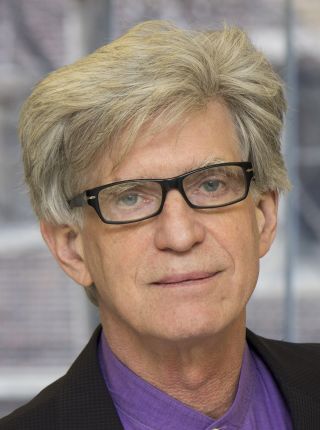Professor John Q. Trojanowski, MD, PhD (1946-2022)
February 10, 2022

It is with profound sadness that we must share the news that our esteemed colleague, mentor, and friend John Q. Trojanowski, MD, PhD, the William Maul Measey - Truman G. Schnabel, Jr., M.D. Professor of Geriatric Medicine and Gerontology in the Department Pathology and Laboratory Medicine, past Director of the Institute on Aging, and one of the foremost pioneers in the field of neuroscience, neuropathology and neurodegenerative diseases, passed away on February 8, 2022, at the age of 75.
Dr. Trojanowski graduated from King's College in Wilkes-Barre, Pennsylvania, with stints at the Erasmus University Rotterdam, the Netherlands, and the University of Vienna, Austria, pursuing his lifelong dream to be a doctor—preferably in exotic places, along the lines of Albert Schweitzer. Then science began to intrigue him even more. He earned his MD and PhD in Neuroanatomy in 1976 from Tufts University before going on train in pathology/neuropathology at Harvard and Penn under Dr. E.P. Richardson and the late Dr. Nicholas Gonatas, respectively.
After Pathology and Neuropathology Residencies at Massachusetts General Hospital and the Hospital of the University of Pennsylvania, he joined the University of Pennsylvania as an Instructor in 1980 and became Assistant Professor in 1981. He was appointed Associate Professor in 1986, full Professor in 1990, and received a secondary Appointment in the Department of Psychiatry in 1991. He received the William Maul Measey - Truman G. Schnabel, Jr., M.D. Professor of Geriatric Medicine and Gerontology Endowed Chair in 2002 when he became Director of the Institute on Aging (IOA). He helped shape the IOA into a model center, catalyzing a wide range of innovative work on aging and aging-related diseases across the entire Penn campus. His leadership helped make Penn one of the top 10 institutions in the country receiving NIA funding. Programs he helped establish include the Marian S. Ware Alzheimer Program, the Penn Alzheimer’s Disease Center, the Morris K. Udall Center of Excellence for Parkinson’s Disease Research, and the NIA Penn U19 Center on Alpha-synuclein Strains in Alzheimer Disease and Related Dementias.
His lifelong career in the science of neurodegenerative diseases was defined by dazzling series of milestones and broken records. He banked his first case in the Center for Neurodegenerative Disease Research (CNDR) brain bank archive in 1985. Recently, the CNDR archived the 2000th case in its brain bank. His first RO1 grant on Intermediate Filament Proteins as Tumor Markers became an NIH R37 MERIT Award on Neurofilament Expression and Tumor Progression. Beginning with his earliest publications in Brain Research (on cells of origin of corpus callosum in non-human primates) in 1974 and a case report in the New England Journal of Medicine on a demonstrated neuronal origin of esthesioneuroblastoma in 1982, he published an astonishing number of about 1,400 co-authored publications in total. In fact, Trojanowski was consistently ranked as an ISI Highly Cited Researcher and as one of the "10 most cited neuroscientists in the world." Google Scholar currently calculates his all-time h-index at 246. (By way of comparison, Stephen Hawking would score an all-time h-index of 128.)
Dr. Trojanowski worked at the national and international level, promoting and advancing aging research, especially related to neurodegenerative diseases. He was active on the NIA's Board of Scientific Counselors, National Advisory Council on Aging, and Neuroscience, Behavior and Sociology of Aging Review Committee. Among many other national leadership positions, he served as president of the American Association of Neuropathology. Dr. Trojanowski was the recipient of an "embarrassing" number of awards, as he said so himself. A few of his recent ones include the 2000 Stanley Cohen Biomedical Research Award of the University of Pennsylvania School of Medicine, the 2002 induction into the Institute of Medicine of the National Academy of Sciences, the 2012 Robert J. and Claire Pasarow Foundation Award in Neuropsychiatry Research, the 2014 J. Allyn Taylor International Prize in Medicine, the 2015 American Association of Neuropathologists Meritorious Contributions Award, and the 2018 Alzheimer’s Association Lifetime Achievement Award.
Dr. Trojanowski, in a longstanding collaboration with his wife and research partner Dr. Virginia M.-Y. Lee, pioneered three historic scientific discoveries in the field of neuroscience and neurodegenerative diseases: the demonstration that tau is the major constituent of neurofibrillary tangles in Alzheimer's disease, the discovery that Lewy bodies are comprised of alpha-synuclein, and the discovery that inclusions in Frontotemporal lobar degeneration (FTLD) and amyotrophic lateral sclerosis (ALS, also known as Lou Gehrig's disease) are made of TDP-43 protein. Despites these historical breakthroughs, he insisted that his biggest achievement was to create awareness for aging as an area of study or "just to make noise about aging," as he put it.
His colleagues remember John as a passionate scientist who was at the same time extremely modest about his accomplishments because he always emphasized the collaborative nature of his work and the teamwork that went into it, as evidenced by his decades-long directorships of the Institute on Aging, the Penn Alzheimer’s Disease Center, the Penn Udall Center for Parkinson’s Research, and the Penn Center on Alpha-synuclein Strains in Alzheimer’s disease.
A tribute to Dr. John Trojanowski's legacy and a celebration of his accomplishments will be forthcoming. This is a sad time for all of us—for Virginia, John’s family, friends, colleagues in the Department, at Penn, and around the world. John’s life and work have had tremendous impact, which itself is a wonderful tribute.
David Roth
Chair
Read the Dean's Announcement
Obituary in the Philadelphia Inquirer
Obituary in the New York Times
Michael J. Fox Foundation tribute
Alzforum tribute
Brain Pathology tribute
Nature tribute
